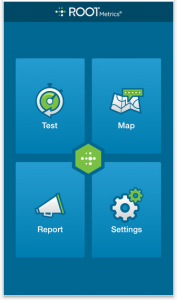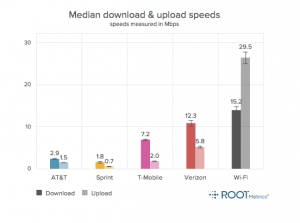Though it only has visited a handful of arenas so far, RootMetrics eventually plans to test more than 100 stadiums this year, according to the company. For each venue, RootMetrics sends an unspecified number of testers to track data performance of the top four wireless carriers in the U.S., a list that includes AT&T, Verizon Wireless, Sprint and T-Mobile. RootMetrics’ venue testers also check performance of the internal Wi-Fi network if one is available, but it does not let Wi-Fi compete for its “RootScore Award,” which it bestows upon the carrier with best performance in the combined categories of speed and “data reliability,” basically a measurement of the ability to make and hold a connection during any wireless data request or action.
RootMetrics also doesn’t take into account whether or not any of the carriers has preferential deals inside a venue, which may give that provider a leg up on the competition. For its report on the Staples Center, for instance, RootMetrics gives its award to Verizon, which is not surprising to us since Verizon built both the Wi-Fi and the DAS network at the facility. But RootMetrics makes no mention of the business agreements at Staples or anywhere else, which is by design, according to the company.
Why can’t Wi-Fi win?
RootMetrics CEO Bill Moore said in a recent phone interview that such details about contracts and preferred suppliers really don’t matter to consumers — what really matters, he said, is how well each carrier performs in the venue.
While the “scoreboard” mentality does perform a service by presenting just what data the testers find, the RootMetrics venue surveys have some gaps that may need to be filled or changed in the future to present a fully accurate picture of stadium network performance. One big reporting gap is the fact that RootMetrics doesn’t use any iOS devices in its stadium tests, a strange omission since most stadium networks say they still see a majority of iPhones among the devices being used on stadium networks. RootMetrics also seems to unfairly leave Wi-Fi networks out of the scoring, even though in many cases so far the local Wi-Fi networks far outperform the carrier cellular links.
For Portland’s Moda Center, for instance, RootMetrics gives its RootScore award to Verizon, since in their testing Verizon was found to have better data reliability and better data speeds than the other cellular carriers. But the stadium’s in-house Wi-Fi network was 3 Mbps faster than Verizon on the download side and more than five times faster than Verizon on the upload side — yet Wi-Fi wasn’t mentioned in the venue “scores” and only got a footnote at the bottom of the results page.Founded in 2008, RootMetrics has (apparently) built a good business in its chosen field, since it was acquired last month by the Englewood, Colo.-based IHS, a large information and analytics concern that recorded $546 million in revenue for its most recent quarter.
In the industry, RootMetrics is well known for its wireless coverage performance map and its “RootScores,” which attempt to determine winners and losers in the wireless service game for major U.S. metropolitan areas and the nation’s busiest airports. The basic RootMetrics premise is that they measure exactly what service levels consumers see in real life, providing an independent way for customers to evaluate services in a given area. While consumers can see the high-level results of its tests — which include both internal testing as well as data “crowdsourced” from consumers who download the RootMetrics reporting app — RootMetrics also sells its information directly to carriers and other infrastructure providers.








